Case Study Analysis: Nursing Error, Patient Safety, and Standards
VerifiedAdded on 2022/10/03
|7
|1419
|37
Case Study
AI Summary
This case study analysis examines a nursing-related event reported in the media, focusing on a medical error that led to a patient's death. The essay delves into the nurse's actions, highlighting violations of the NMBA Registered Nurse Standards for Practice, particularly the failure to think critically and adhere to evidence-based practice. It discusses the importance of critical reflection and the application of the NSQHS standards to improve nursing practice and reduce the risk of similar errors. The analysis emphasizes the need for nurses to apply evidence-based practice, consult with supervisors, and possess adequate knowledge of medications and patient health conditions to ensure safe and quality patient care. The essay concludes by reiterating the importance of following guidelines and nursing standards, applying a holistic approach, and developing core competencies to improve patient outcomes.
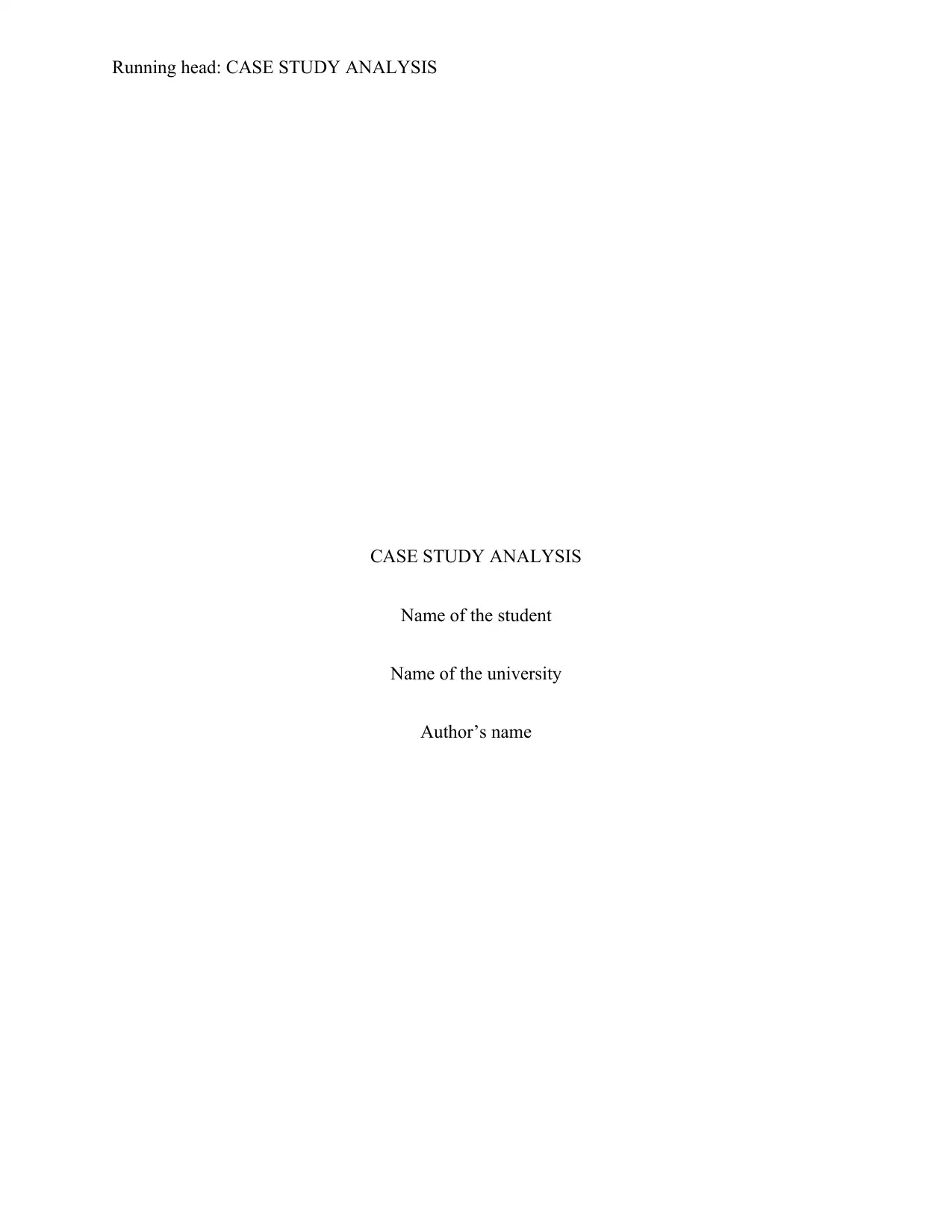
Running head: CASE STUDY ANALYSIS
CASE STUDY ANALYSIS
Name of the student
Name of the university
Author’s name
CASE STUDY ANALYSIS
Name of the student
Name of the university
Author’s name
Paraphrase This Document
Need a fresh take? Get an instant paraphrase of this document with our AI Paraphraser
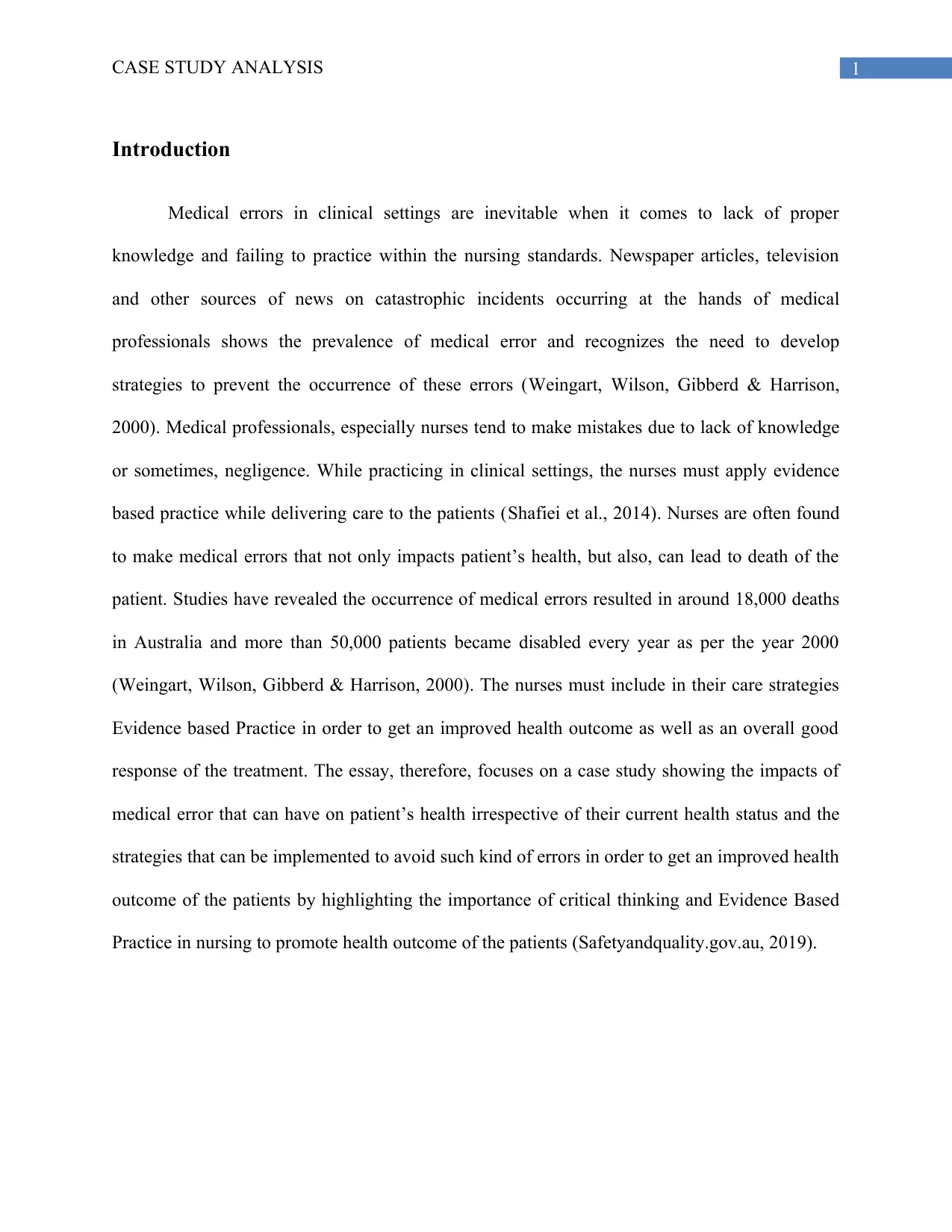
1CASE STUDY ANALYSIS
Introduction
Medical errors in clinical settings are inevitable when it comes to lack of proper
knowledge and failing to practice within the nursing standards. Newspaper articles, television
and other sources of news on catastrophic incidents occurring at the hands of medical
professionals shows the prevalence of medical error and recognizes the need to develop
strategies to prevent the occurrence of these errors (Weingart, Wilson, Gibberd & Harrison,
2000). Medical professionals, especially nurses tend to make mistakes due to lack of knowledge
or sometimes, negligence. While practicing in clinical settings, the nurses must apply evidence
based practice while delivering care to the patients (Shafiei et al., 2014). Nurses are often found
to make medical errors that not only impacts patient’s health, but also, can lead to death of the
patient. Studies have revealed the occurrence of medical errors resulted in around 18,000 deaths
in Australia and more than 50,000 patients became disabled every year as per the year 2000
(Weingart, Wilson, Gibberd & Harrison, 2000). The nurses must include in their care strategies
Evidence based Practice in order to get an improved health outcome as well as an overall good
response of the treatment. The essay, therefore, focuses on a case study showing the impacts of
medical error that can have on patient’s health irrespective of their current health status and the
strategies that can be implemented to avoid such kind of errors in order to get an improved health
outcome of the patients by highlighting the importance of critical thinking and Evidence Based
Practice in nursing to promote health outcome of the patients (Safetyandquality.gov.au, 2019).
Introduction
Medical errors in clinical settings are inevitable when it comes to lack of proper
knowledge and failing to practice within the nursing standards. Newspaper articles, television
and other sources of news on catastrophic incidents occurring at the hands of medical
professionals shows the prevalence of medical error and recognizes the need to develop
strategies to prevent the occurrence of these errors (Weingart, Wilson, Gibberd & Harrison,
2000). Medical professionals, especially nurses tend to make mistakes due to lack of knowledge
or sometimes, negligence. While practicing in clinical settings, the nurses must apply evidence
based practice while delivering care to the patients (Shafiei et al., 2014). Nurses are often found
to make medical errors that not only impacts patient’s health, but also, can lead to death of the
patient. Studies have revealed the occurrence of medical errors resulted in around 18,000 deaths
in Australia and more than 50,000 patients became disabled every year as per the year 2000
(Weingart, Wilson, Gibberd & Harrison, 2000). The nurses must include in their care strategies
Evidence based Practice in order to get an improved health outcome as well as an overall good
response of the treatment. The essay, therefore, focuses on a case study showing the impacts of
medical error that can have on patient’s health irrespective of their current health status and the
strategies that can be implemented to avoid such kind of errors in order to get an improved health
outcome of the patients by highlighting the importance of critical thinking and Evidence Based
Practice in nursing to promote health outcome of the patients (Safetyandquality.gov.au, 2019).
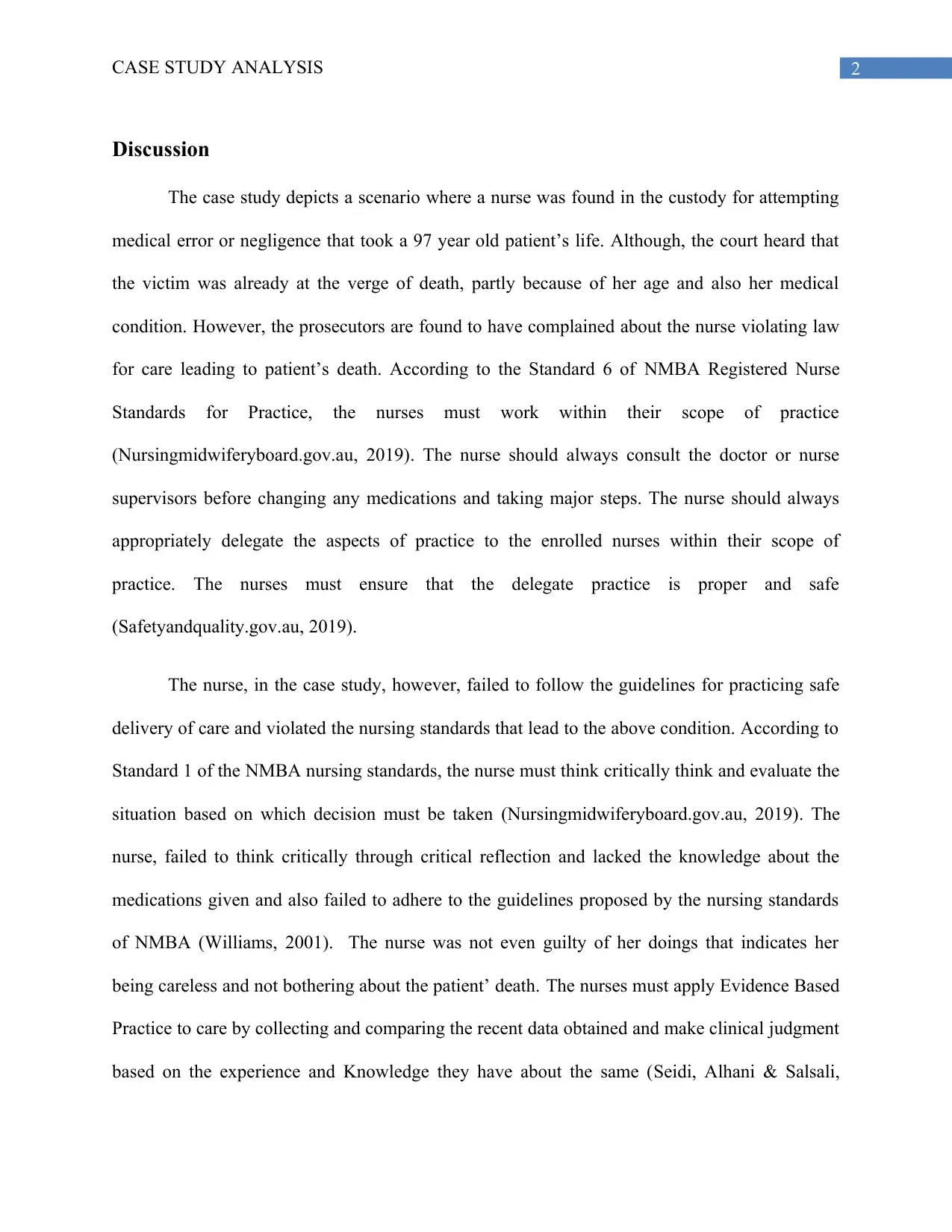
2CASE STUDY ANALYSIS
Discussion
The case study depicts a scenario where a nurse was found in the custody for attempting
medical error or negligence that took a 97 year old patient’s life. Although, the court heard that
the victim was already at the verge of death, partly because of her age and also her medical
condition. However, the prosecutors are found to have complained about the nurse violating law
for care leading to patient’s death. According to the Standard 6 of NMBA Registered Nurse
Standards for Practice, the nurses must work within their scope of practice
(Nursingmidwiferyboard.gov.au, 2019). The nurse should always consult the doctor or nurse
supervisors before changing any medications and taking major steps. The nurse should always
appropriately delegate the aspects of practice to the enrolled nurses within their scope of
practice. The nurses must ensure that the delegate practice is proper and safe
(Safetyandquality.gov.au, 2019).
The nurse, in the case study, however, failed to follow the guidelines for practicing safe
delivery of care and violated the nursing standards that lead to the above condition. According to
Standard 1 of the NMBA nursing standards, the nurse must think critically think and evaluate the
situation based on which decision must be taken (Nursingmidwiferyboard.gov.au, 2019). The
nurse, failed to think critically through critical reflection and lacked the knowledge about the
medications given and also failed to adhere to the guidelines proposed by the nursing standards
of NMBA (Williams, 2001). The nurse was not even guilty of her doings that indicates her
being careless and not bothering about the patient’ death. The nurses must apply Evidence Based
Practice to care by collecting and comparing the recent data obtained and make clinical judgment
based on the experience and Knowledge they have about the same (Seidi, Alhani & Salsali,
Discussion
The case study depicts a scenario where a nurse was found in the custody for attempting
medical error or negligence that took a 97 year old patient’s life. Although, the court heard that
the victim was already at the verge of death, partly because of her age and also her medical
condition. However, the prosecutors are found to have complained about the nurse violating law
for care leading to patient’s death. According to the Standard 6 of NMBA Registered Nurse
Standards for Practice, the nurses must work within their scope of practice
(Nursingmidwiferyboard.gov.au, 2019). The nurse should always consult the doctor or nurse
supervisors before changing any medications and taking major steps. The nurse should always
appropriately delegate the aspects of practice to the enrolled nurses within their scope of
practice. The nurses must ensure that the delegate practice is proper and safe
(Safetyandquality.gov.au, 2019).
The nurse, in the case study, however, failed to follow the guidelines for practicing safe
delivery of care and violated the nursing standards that lead to the above condition. According to
Standard 1 of the NMBA nursing standards, the nurse must think critically think and evaluate the
situation based on which decision must be taken (Nursingmidwiferyboard.gov.au, 2019). The
nurse, failed to think critically through critical reflection and lacked the knowledge about the
medications given and also failed to adhere to the guidelines proposed by the nursing standards
of NMBA (Williams, 2001). The nurse was not even guilty of her doings that indicates her
being careless and not bothering about the patient’ death. The nurses must apply Evidence Based
Practice to care by collecting and comparing the recent data obtained and make clinical judgment
based on the experience and Knowledge they have about the same (Seidi, Alhani & Salsali,
⊘ This is a preview!⊘
Do you want full access?
Subscribe today to unlock all pages.

Trusted by 1+ million students worldwide
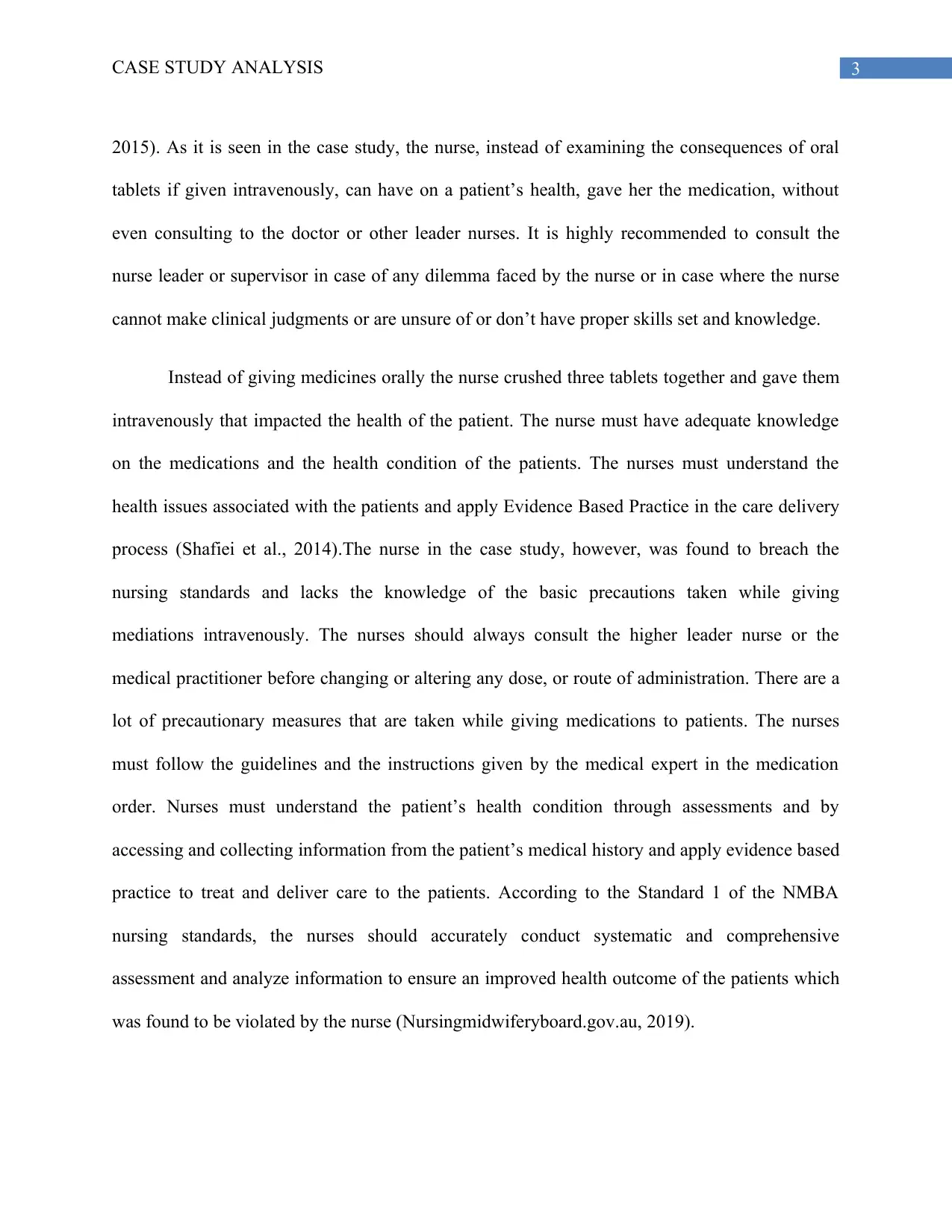
3CASE STUDY ANALYSIS
2015). As it is seen in the case study, the nurse, instead of examining the consequences of oral
tablets if given intravenously, can have on a patient’s health, gave her the medication, without
even consulting to the doctor or other leader nurses. It is highly recommended to consult the
nurse leader or supervisor in case of any dilemma faced by the nurse or in case where the nurse
cannot make clinical judgments or are unsure of or don’t have proper skills set and knowledge.
Instead of giving medicines orally the nurse crushed three tablets together and gave them
intravenously that impacted the health of the patient. The nurse must have adequate knowledge
on the medications and the health condition of the patients. The nurses must understand the
health issues associated with the patients and apply Evidence Based Practice in the care delivery
process (Shafiei et al., 2014).The nurse in the case study, however, was found to breach the
nursing standards and lacks the knowledge of the basic precautions taken while giving
mediations intravenously. The nurses should always consult the higher leader nurse or the
medical practitioner before changing or altering any dose, or route of administration. There are a
lot of precautionary measures that are taken while giving medications to patients. The nurses
must follow the guidelines and the instructions given by the medical expert in the medication
order. Nurses must understand the patient’s health condition through assessments and by
accessing and collecting information from the patient’s medical history and apply evidence based
practice to treat and deliver care to the patients. According to the Standard 1 of the NMBA
nursing standards, the nurses should accurately conduct systematic and comprehensive
assessment and analyze information to ensure an improved health outcome of the patients which
was found to be violated by the nurse (Nursingmidwiferyboard.gov.au, 2019).
2015). As it is seen in the case study, the nurse, instead of examining the consequences of oral
tablets if given intravenously, can have on a patient’s health, gave her the medication, without
even consulting to the doctor or other leader nurses. It is highly recommended to consult the
nurse leader or supervisor in case of any dilemma faced by the nurse or in case where the nurse
cannot make clinical judgments or are unsure of or don’t have proper skills set and knowledge.
Instead of giving medicines orally the nurse crushed three tablets together and gave them
intravenously that impacted the health of the patient. The nurse must have adequate knowledge
on the medications and the health condition of the patients. The nurses must understand the
health issues associated with the patients and apply Evidence Based Practice in the care delivery
process (Shafiei et al., 2014).The nurse in the case study, however, was found to breach the
nursing standards and lacks the knowledge of the basic precautions taken while giving
mediations intravenously. The nurses should always consult the higher leader nurse or the
medical practitioner before changing or altering any dose, or route of administration. There are a
lot of precautionary measures that are taken while giving medications to patients. The nurses
must follow the guidelines and the instructions given by the medical expert in the medication
order. Nurses must understand the patient’s health condition through assessments and by
accessing and collecting information from the patient’s medical history and apply evidence based
practice to treat and deliver care to the patients. According to the Standard 1 of the NMBA
nursing standards, the nurses should accurately conduct systematic and comprehensive
assessment and analyze information to ensure an improved health outcome of the patients which
was found to be violated by the nurse (Nursingmidwiferyboard.gov.au, 2019).
Paraphrase This Document
Need a fresh take? Get an instant paraphrase of this document with our AI Paraphraser
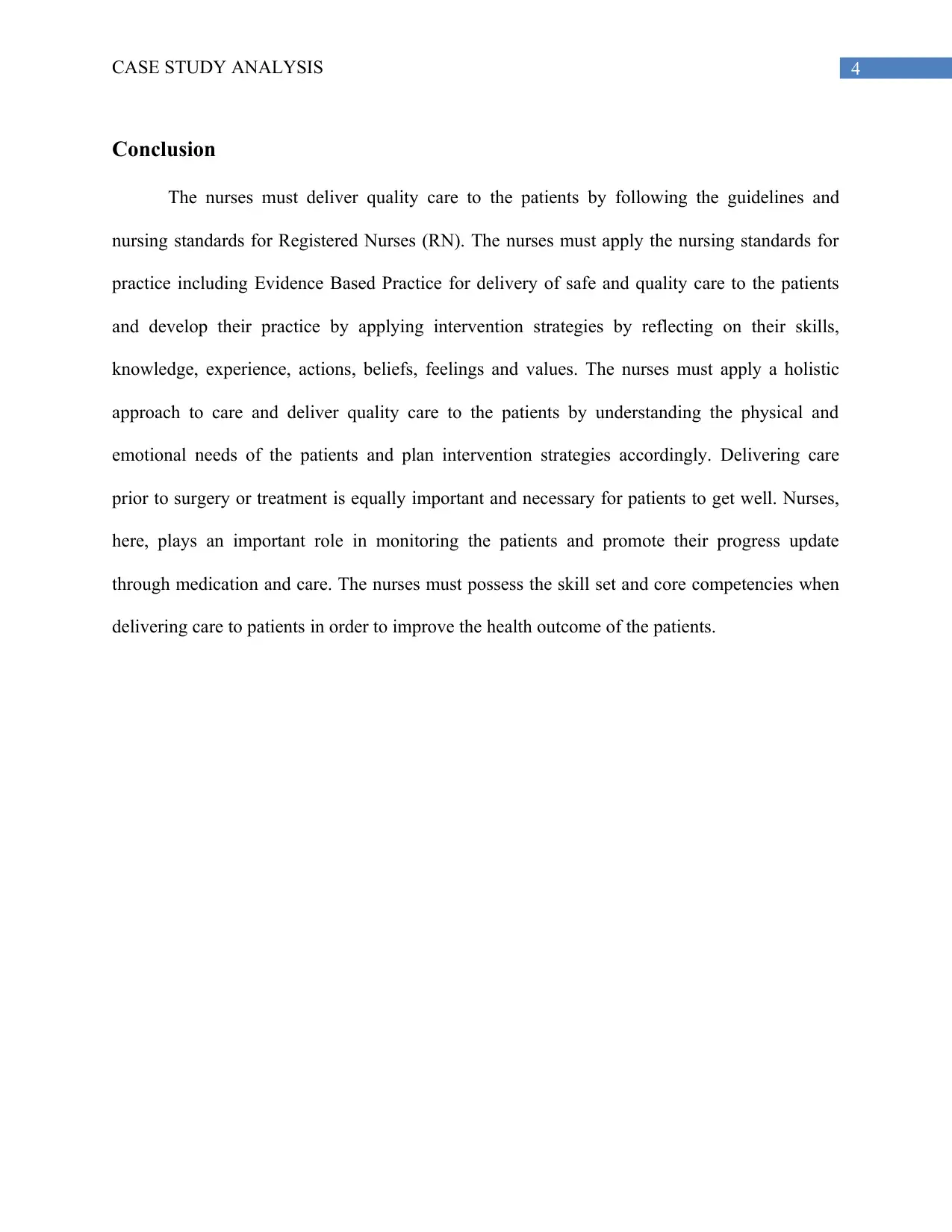
4CASE STUDY ANALYSIS
Conclusion
The nurses must deliver quality care to the patients by following the guidelines and
nursing standards for Registered Nurses (RN). The nurses must apply the nursing standards for
practice including Evidence Based Practice for delivery of safe and quality care to the patients
and develop their practice by applying intervention strategies by reflecting on their skills,
knowledge, experience, actions, beliefs, feelings and values. The nurses must apply a holistic
approach to care and deliver quality care to the patients by understanding the physical and
emotional needs of the patients and plan intervention strategies accordingly. Delivering care
prior to surgery or treatment is equally important and necessary for patients to get well. Nurses,
here, plays an important role in monitoring the patients and promote their progress update
through medication and care. The nurses must possess the skill set and core competencies when
delivering care to patients in order to improve the health outcome of the patients.
Conclusion
The nurses must deliver quality care to the patients by following the guidelines and
nursing standards for Registered Nurses (RN). The nurses must apply the nursing standards for
practice including Evidence Based Practice for delivery of safe and quality care to the patients
and develop their practice by applying intervention strategies by reflecting on their skills,
knowledge, experience, actions, beliefs, feelings and values. The nurses must apply a holistic
approach to care and deliver quality care to the patients by understanding the physical and
emotional needs of the patients and plan intervention strategies accordingly. Delivering care
prior to surgery or treatment is equally important and necessary for patients to get well. Nurses,
here, plays an important role in monitoring the patients and promote their progress update
through medication and care. The nurses must possess the skill set and core competencies when
delivering care to patients in order to improve the health outcome of the patients.
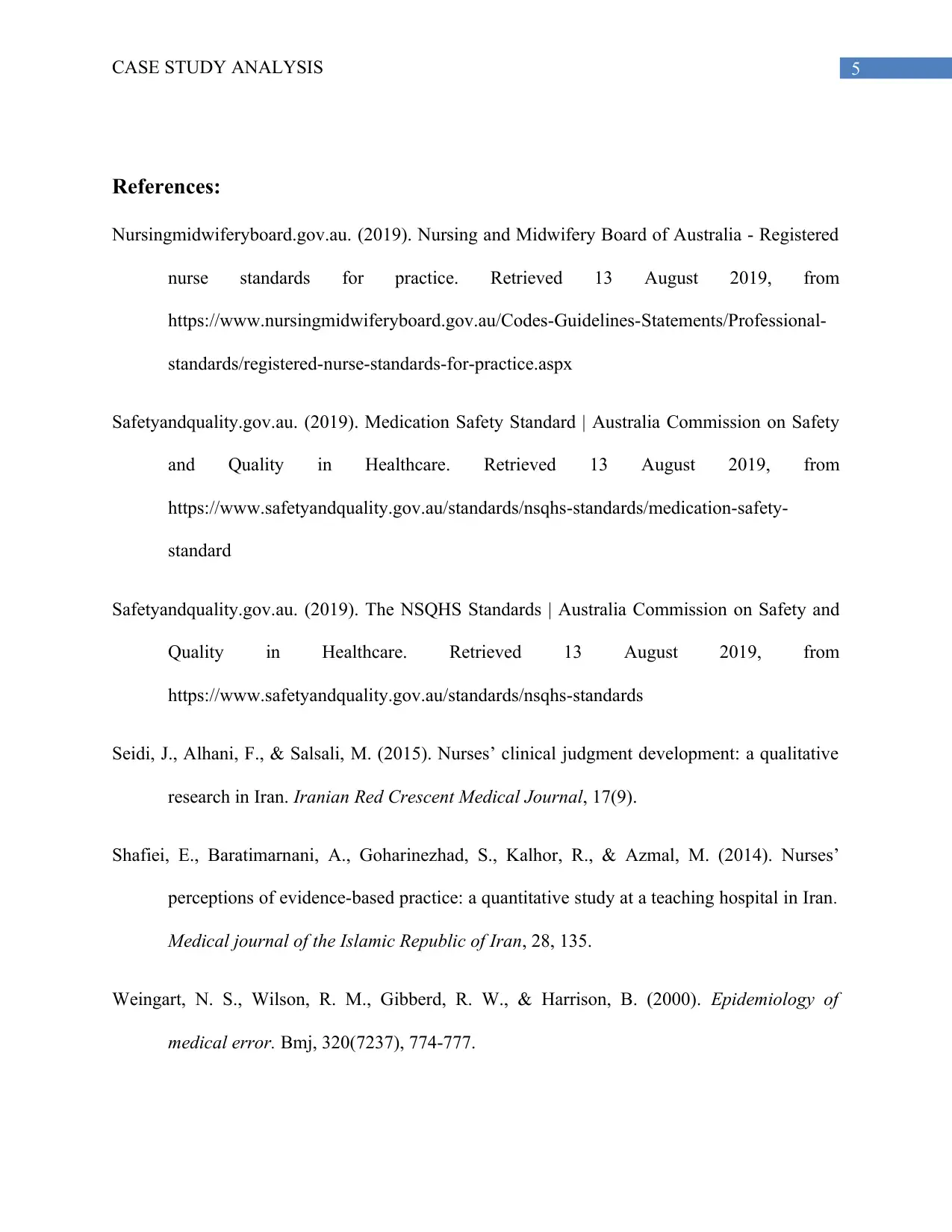
5CASE STUDY ANALYSIS
References:
Nursingmidwiferyboard.gov.au. (2019). Nursing and Midwifery Board of Australia - Registered
nurse standards for practice. Retrieved 13 August 2019, from
https://www.nursingmidwiferyboard.gov.au/Codes-Guidelines-Statements/Professional-
standards/registered-nurse-standards-for-practice.aspx
Safetyandquality.gov.au. (2019). Medication Safety Standard | Australia Commission on Safety
and Quality in Healthcare. Retrieved 13 August 2019, from
https://www.safetyandquality.gov.au/standards/nsqhs-standards/medication-safety-
standard
Safetyandquality.gov.au. (2019). The NSQHS Standards | Australia Commission on Safety and
Quality in Healthcare. Retrieved 13 August 2019, from
https://www.safetyandquality.gov.au/standards/nsqhs-standards
Seidi, J., Alhani, F., & Salsali, M. (2015). Nurses’ clinical judgment development: a qualitative
research in Iran. Iranian Red Crescent Medical Journal, 17(9).
Shafiei, E., Baratimarnani, A., Goharinezhad, S., Kalhor, R., & Azmal, M. (2014). Nurses’
perceptions of evidence-based practice: a quantitative study at a teaching hospital in Iran.
Medical journal of the Islamic Republic of Iran, 28, 135.
Weingart, N. S., Wilson, R. M., Gibberd, R. W., & Harrison, B. (2000). Epidemiology of
medical error. Bmj, 320(7237), 774-777.
References:
Nursingmidwiferyboard.gov.au. (2019). Nursing and Midwifery Board of Australia - Registered
nurse standards for practice. Retrieved 13 August 2019, from
https://www.nursingmidwiferyboard.gov.au/Codes-Guidelines-Statements/Professional-
standards/registered-nurse-standards-for-practice.aspx
Safetyandquality.gov.au. (2019). Medication Safety Standard | Australia Commission on Safety
and Quality in Healthcare. Retrieved 13 August 2019, from
https://www.safetyandquality.gov.au/standards/nsqhs-standards/medication-safety-
standard
Safetyandquality.gov.au. (2019). The NSQHS Standards | Australia Commission on Safety and
Quality in Healthcare. Retrieved 13 August 2019, from
https://www.safetyandquality.gov.au/standards/nsqhs-standards
Seidi, J., Alhani, F., & Salsali, M. (2015). Nurses’ clinical judgment development: a qualitative
research in Iran. Iranian Red Crescent Medical Journal, 17(9).
Shafiei, E., Baratimarnani, A., Goharinezhad, S., Kalhor, R., & Azmal, M. (2014). Nurses’
perceptions of evidence-based practice: a quantitative study at a teaching hospital in Iran.
Medical journal of the Islamic Republic of Iran, 28, 135.
Weingart, N. S., Wilson, R. M., Gibberd, R. W., & Harrison, B. (2000). Epidemiology of
medical error. Bmj, 320(7237), 774-777.
⊘ This is a preview!⊘
Do you want full access?
Subscribe today to unlock all pages.

Trusted by 1+ million students worldwide
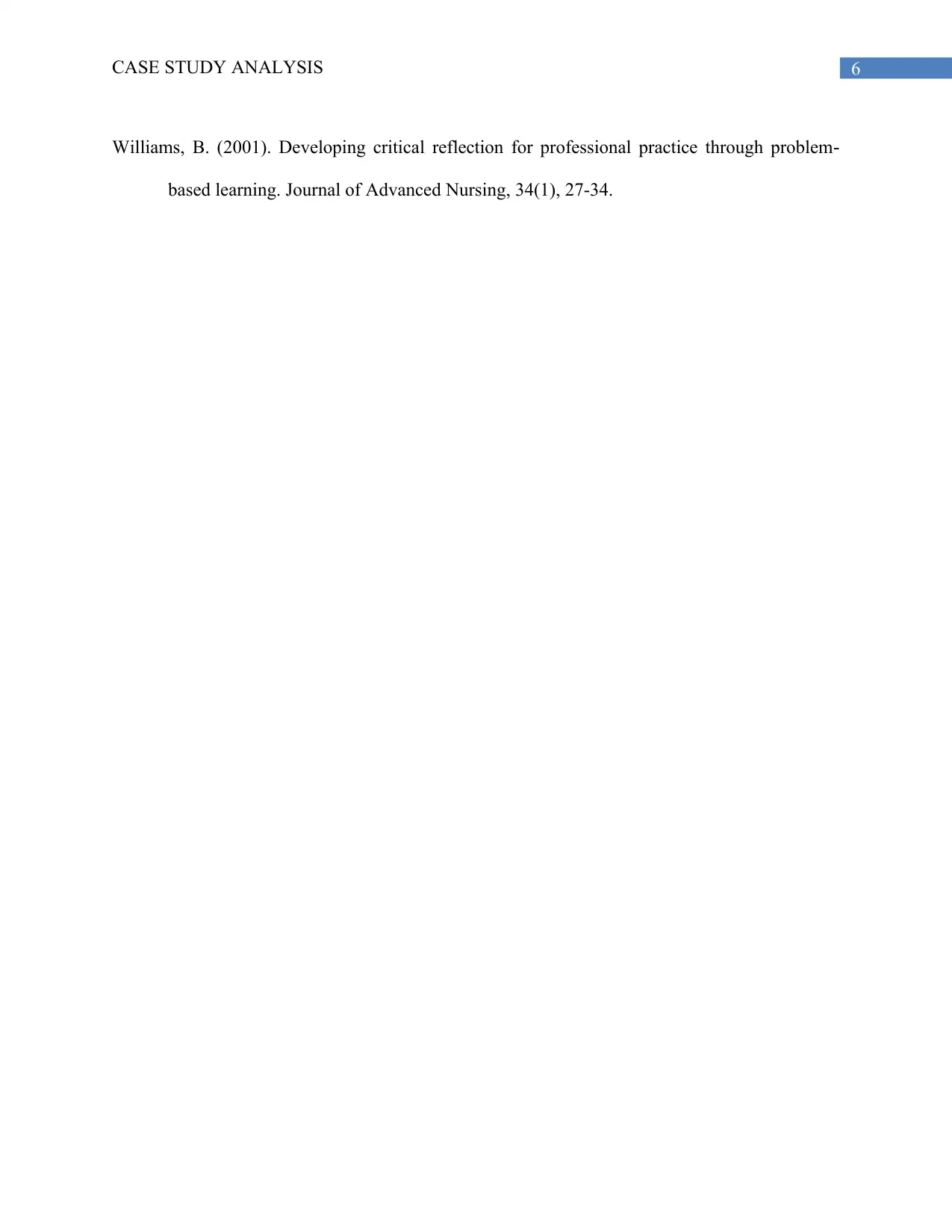
6CASE STUDY ANALYSIS
Williams, B. (2001). Developing critical reflection for professional practice through problem‐
based learning. Journal of Advanced Nursing, 34(1), 27-34.
Williams, B. (2001). Developing critical reflection for professional practice through problem‐
based learning. Journal of Advanced Nursing, 34(1), 27-34.
1 out of 7
Related Documents
Your All-in-One AI-Powered Toolkit for Academic Success.
+13062052269
info@desklib.com
Available 24*7 on WhatsApp / Email
![[object Object]](/_next/static/media/star-bottom.7253800d.svg)
Unlock your academic potential
Copyright © 2020–2026 A2Z Services. All Rights Reserved. Developed and managed by ZUCOL.





